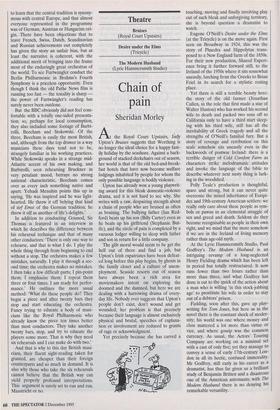Theatre
Bruises (Royal Court Upstairs) Desire under the Elms (Tricycle) The Modern Husband (Lyric Hammersmith Studio)
Chain of pain
Sheridan Morley
Athe Royal Court Upstairs, JUdy Upton's Bruises suggests that Worthing is no longer the ideal choice for a happy fam- ily holiday by the seashore. Against a back- ground of stacked deckchairs out of season, her world is that of the old bed-and-break- fast hotels that have now become welfare lodgings inhabited by people for whom the only possible language is bodily violence.
Upton has already won a young playwrit- ing award for this bleak domestic-violence drama, and it is not hard to see why. She writes with a raw, despairing strength about a chain of people who are bruised as often as bruising. The bullying father (Ian Red- ford) beats up his son (Billy Carter) even as he beats up his girlfriend (Stephanie But- tle), and the circle of pain is completed by a vacuous lodger willing to sleep with father and son in return for a little company.
The glib moral would seem to be get the hell out of there and find a job, but Upton's Irish expatriates have been defeat- ed long before this play begins, by ghosts in the family closet and a culture of unem- ployment. Seaside resorts out of season have always been a rich area for moviemakers intent on exploring the doomed and the damned, but here we are dealing with a harrowing drama of every- day life. Nobody ever suggests that Upton's people don't exist, don't wound and get wounded; her problem is that precisely because their language is almost exclusively physical and brutal, speeches of explana- tion or involvement are reduced to grunts of rage or acknowledgment.
Yet precisely because she has carved a touching, moving and finally involving play out of such bleak and unforgiving territory, she is beyond question a dramatist to watch.
Eugene O'Neill's Desire under the Elms (at the Tricycle) is on the move again. First seen on Broadway in 1924, this was the story of Phaedra and Hippolytus trans- posed to a New England farm of the 1850s. For their new production, Shared Experi- ence bring it further forward still, to the Ireland of the 1950s where it sits somewhat uneasily, lurching from the Greeks to Brian Friel in its search for a stylistic resting place.
Yet there is still a terrible beauty here: the story of the old farmer (Jonathan Cullen, in the role that first made a star of Walter Huston) who has worked his second wife to death and packed two sons off to California only to have a third start sleep- ing with his third wife, still has all the inevitability of Greek tragedy and all the strengths of O'Neill's familial fury. But a story of revenge and retribution on this scale somehow sits uneasily even in the backwoods of postwar Ireland: there is a terrible danger of Cold Comfort Farm as characters strike melodramatic attitudes and invoke the language of the bible to describe whatever next nasty thing is lurk- ing in the woodshed.
Polly Teale's production is thoughtful, spare and strong, but it can never quite overcome the mixed inheritance of Euripi- des and 19th-century American settlers: we really only care about these people as sym- bols or pawns in an elemental struggle of sex and greed and death. Seldom do they become recognisable as people in their own right, and we mind that the more somehow if we are in the Ireland of living memory rather than age-old myth.
At the Lyric Hammersmith Studio, Paul Godfrey's The Modern Husband is an intriguing revamp of a long-neglected Henry Fielding drama which has been left in period but totally restructured. It now runs fewer than two hours rather than more than three, and what Godfrey has done is cut to the quick of the action about a man who is willing 'in this stock-jobbing age' to prostitute his wife in order to stay out of a debtors' prison.
Fielding, soon after this, gave up play- writing for Tom Jones, but here as in the novel there is the constant shock of moder- nity; his world was one where money and class mattered a lot more than virtue or vice, and where gossip was the common currency. As usual, the Actors' Touring Company are working on a minimal set with a cast of only five; yet they manage to convey a sense of early 17th-century Lon- don in all its hectic, confused immorality. Mr Godfrey, still early in his career as a dramatist, has thus far given us a brilliant study of Benjamin Britten and a disastrous one of the American astronauts; with The Modern Husband there is no denying his remarkable versatility.










































































 Previous page
Previous page